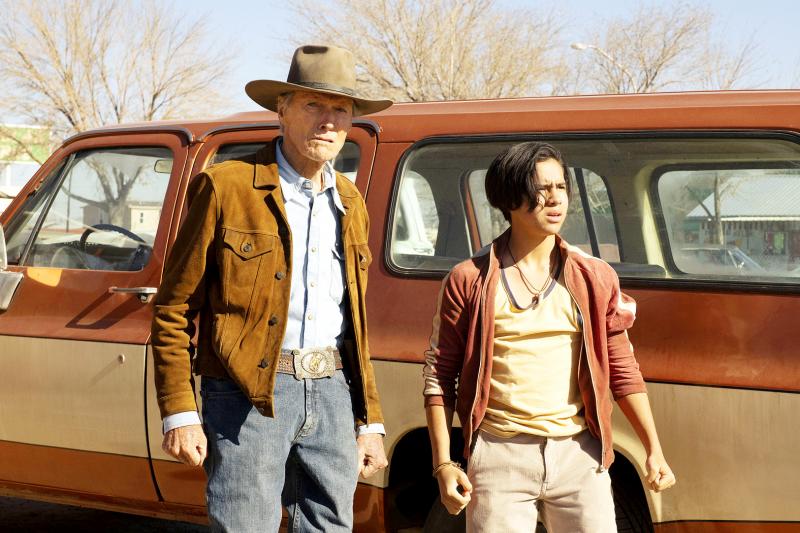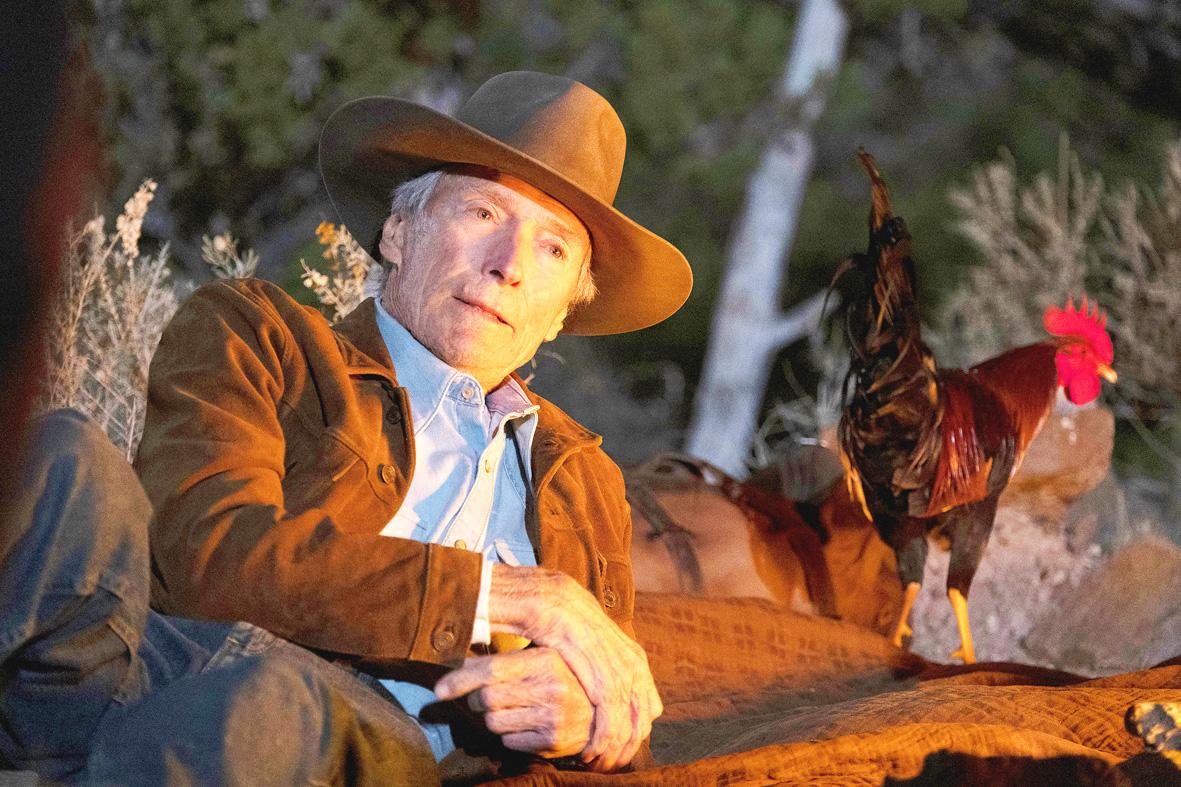Last year, Tom Hanks and George Clooney each took on movie parts in which they showed off their fatherly sides by taking care of a child. Apparently, there’s something in the water over in Hollywood because this month, it’s time for Clint Eastwood.
The one-time Dirty Harry directs and stars as a crochety old cowboy pressed into transporting a teenager from Mexico to America in Cry Macho, an aimless and sometimes cringe-worthy film. But it has perhaps the best performance by a rooster in modern cinematic history.
The film is apparently supposed to be a meditation on masculinity, with Eastwood’s one-time rodeo star Mike Milo taming and rebuilding his young rebellious charge into an honorable young man. Instead, it’s a meditation on clumsy and predictable filmmaking.

Photo: AP
The screenplay, by Nick Schenk and the late Richard Nash, is based on Nash’s book. Schenk is film’s leading Eastwood interpreter, having written for the icon before with Gran Torino and The Mule. Eastwood, now 91, is in that place he’s found himself so many times before: A gruff, honorable loner with a heart of gold.
The year is 1979 and the honorable loner — a widower, naturally — is still showing up at the rodeo for work in his 90s until his boss fires him.
“You’re a loss to no one. It’s time for new blood,” says his employer, played by Dwight Yoakam.

Photo: AP
A year later, this same boss inexplicably asks Mike for a favor: Get my son away from the clutches of my evil ex-wife in Mexico and bring him to me. Soon Eastwood is on his way south, trundling along in an ancient car.
Turns out the ex-wife (Fernanda Urrejola, overdoing it) is an unbalanced mob boss who both laughs at this curious visitor and weirdly wants to bed him.
“You think you’re the first my ex-husband sent?” she mocks him.
Eastwood’s character finds the boy — did you doubt he would? — but the teen is a bit of a mess, psychologically. One telltale sign is that he’s overly fond of a fighting rooster he has called Macho and carries about everywhere.
The boy, Rafo, shows signs of physical abuse but the filmmakers raise the issue without really confronting it. The boy and the rooster are more for comic effect, like when the youngster comments to the oldster: “You get too angry. It’s not good for you at your age.”
The rooster, however, vocalizes his emotions and defends those he loves with a flurry of feathers and pecks; he should have his own film franchise.
The dialogue here is stilted, as if to conform to the plain brusqueness of Eastwood’s favored loners. “Can I wear your hat?” the boy asks. “No,” says Eastwood. “Why not?” asks the boy. “Because it’s a cowboy hat. And you’re not a cowboy,” comes the answer.
Eduardo Minett plays the teen with varying degrees of success, unable to really deliver the killer lines about his rotten past like, “On the street, I trust no one. But it is safer than home.”
For Eastwood’s part, he gets less grouchy: “You’re kind of growing on me, kid.”
But the worst dialogue is given to an unfathomable love interest, portrayed by Natalia Traven, playing a feisty widow who must say things like: “You’re a good man. I hope you know that.” It’s all pretty awkward. When the couple dance it looks as if she’s holding up a frail Eastwood in case he falls.
Anyway, Eastwood’s character and the boy are soon stranded in a dusty Mexican town. The older man starts caring for the townsfolk’s animals because he seems to be aware of basic biology and also teaches the boy to be a cowboy. In one queasy scene, Eastwood’s stunt double obviously breaks a mustang in. How do we know it’s a stunt double? Eastwood has trouble walking let along riding a bucking, snarling horse.
Cry Macho then veers off its road-movie premise and becomes a romantic comedy. Eastwood flowers in this Mexican town, fixing jukeboxes, reading stories to kids and apparently being a hot tamale for widows. He and the boy talk about life, religion and what it means to be strong. But it’s not clear what anyone has learned about masculinity and the film ends on a sour note.
At one point, Eastwood’s character says to the boy: “This macho thing is overrated.” To which the audience will likely say: Totally.
Cry Macho will appear in local theaters beginning Oct. 22.

Not long into Mistress Dispeller, a quietly jaw-dropping new documentary from director Elizabeth Lo, the film’s eponymous character lays out her thesis for ridding marriages of troublesome extra lovers. “When someone becomes a mistress,” she says, “it’s because they feel they don’t deserve complete love. She’s the one who needs our help the most.” Wang Zhenxi, a mistress dispeller based in north-central China’s Henan province, is one of a growing number of self-styled professionals who earn a living by intervening in people’s marriages — to “dispel” them of intruders. “I was looking for a love story set in China,” says Lo,

It was on his honeymoon in Kuala Lumpur, looking out of his hotel window at the silvery points of the world’s tallest twin skyscrapers, that Frank decided it was time to become taller. He had recently confessed to his new wife how much his height had bothered him since he was a teenager. As a man dedicated to self-improvement, Frank wanted to take action. He picked up the phone, called a clinic in Turkey that specializes in leg lengthening surgery — and made a booking. “I had a lot of second thoughts — at the end of the day, someone’s going

In the next few months tough decisions will need to be made by the Taiwan People’s Party (TPP) and their pan-blue allies in the Chinese Nationalist Party (KMT). It will reveal just how real their alliance is with actual power at stake. Party founder Ko Wen-je (柯文哲) faced these tough questions, which we explored in part one of this series, “Ko Wen-je, the KMT’s prickly ally,” (Aug. 16, page 12). Ko was open to cooperation, but on his terms. He openly fretted about being “swallowed up” by the KMT, and was keenly aware of the experience of the People’s First Party

Standing on top of a small mountain, Kim Seung-ho gazes out over an expanse of paddy fields glowing in their autumn gold, the ripening grains swaying gently in the wind. In the distance, North Korea stretches beyond the horizon. “It’s so peaceful,” says the director of the DMZ Ecology Research Institute. “Over there, it used to be an artillery range, but since they stopped firing, the nature has become so beautiful.” The land before him is the demilitarized zone, or DMZ, a strip of land that runs across the Korean peninsula, dividing North and South Korea roughly along the 38th parallel north. This